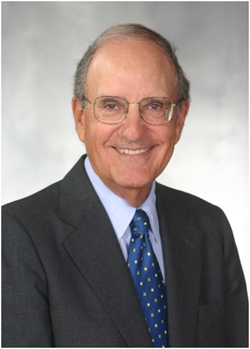 Former U.S. Sen. George J. Mitchell, a former majority leader known for efforts to broker peace in Northern Ireland and the Middle East, is the ideal Jefferson medalist, according to Paul Mahoney, dean of the U.Va. School of Law.
Former U.S. Sen. George J. Mitchell, a former majority leader known for efforts to broker peace in Northern Ireland and the Middle East, is the ideal Jefferson medalist, according to Paul Mahoney, dean of the U.Va. School of Law.
"Like Jefferson, an intellectual, a leader, a legislator and a diplomat, Senator Mitchell has served the nation in many capacities but always with judgment, wisdom and fair-mindedness," he said.
Mitchell, 78, most recently served as special envoy for Middle East peace under President Obama, a role in which he led American efforts to advance Israeli-Palestinian peace negotiations. When Mitchell stepped down in May, Obama said in a statement that Mitchell was "a tireless advocate for peace."
"His deep commitment to resolving conflict and advancing democracy has contributed immeasurably to the goal of two states living side-by-side in peace and security," Obama said. "George told me when he took this job that he would put in a couple of years, and I'm so glad he did. He is – by any measure – one of the finest public servants that our nation has ever had."
Mitchell, a native of Maine, was one of five children born to George Mitchell Sr. and Mary Saad Mitchell. His mother was an immigrant from Lebanon and his father was the orphan son of Irish immigrants.
He graduated from Bowdoin College in 1954, served in the U.S. Army, and in 1961 received his law degree from Georgetown University after studying as a part-time student.
Prior to serving as the Obama administration's point person on Middle East peace, Mitchell had a long career in public service. In 2008, Time Magazine named him one of the world's 100 most influential people.
A Democrat, Mitchell entered the Senate in 1980 and went on to serve as Senate majority leader from 1989 until 1995. He led the 1990 reauthorization of the Clean Air Act, which included new controls on acid rain toxins, and wrote the first national oil spill prevention and clean-up law. He led the Senate in its passage of the first child care bill and was principal author of the low-income housing tax credit program. And he played a key role in the passage of the Americans with Disabilities Act, as well as the ratification of the North American Free Trade Agreement and creation of the World Trade Organization.
After leaving the Senate in 1995, Mitchell was named special adviser to President Clinton on Ireland and served as chairman of the Northern Ireland peace talks. Under his leadership, the negotiations resulted in the Good Friday Peace Agreement, which brought an end to decades of conflict. He documented his experience in "Making Peace," one of four books he has authored.
For his service in Northern Ireland, Mitchell received numerous awards and honors, including the Presidential Medal of Freedom, the highest civilian honor given by the U.S. government.
Mitchell chaired an international fact-finding committee on violence in the Middle East in 2000 and 2001. The committee's recommendation, known as the Mitchell Report, was endorsed by the administration of President George W. Bush, the European Union and other governments.
He led an investigation into the use of performance-enhancing drugs in Major League Baseball in 2006-07. He also was chairman of a special commission that probed allegations of impropriety in the Olympic Games bidding process. And he served as the independent overseer of the American Red Cross Liberty Fund, which helped victims and their families following the Sept. 11 terrorist attacks.